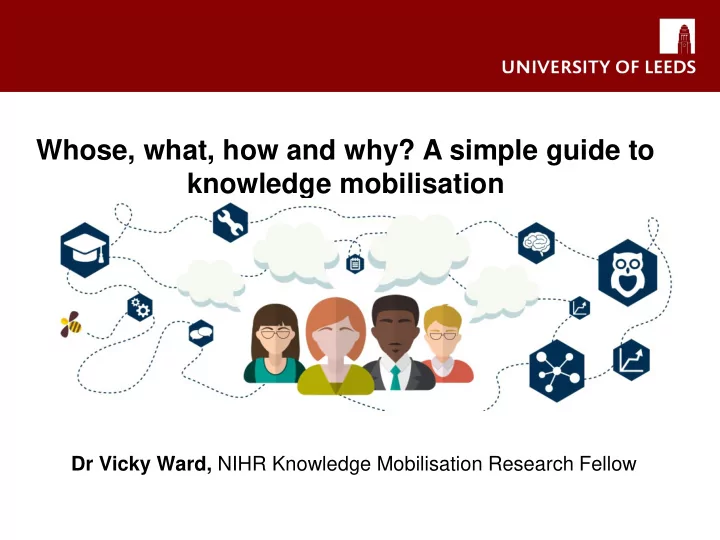

Whose, what, how and why? A simple guide to knowledge mobilisation Dr Vicky Ward, NIHR Knowledge Mobilisation Research Fellow
A bit about me…
What is KM? • Knowledge mobilization involves making knowledge readily accessible – and thereby useful to any number of individuals and groups in society – by developing ways in which groups can work together collaboratively to produce and share knowledge. (http://whatiskt.wikispaces.com/Knowledge+Mobilization) • The term Knowledge Mobilization (KMb) refers to moving available knowledge into active use. More than just "bridging the gap", KMb seeks to make connections between research/expertise and policy/practice in order to improve outcomes in various organizations or sectors. KMb, or knowledge mobilization, is the term most often used by the social science and humanities fields in Canada. (http://en.wikipedia.org/wiki/Knowledge_mobilization)
My KM journey
My KM journey
My KM journey
My KM journey • KM literature – Ferlie, 2012 – 684 papers on KM work in the social sciences (including business and management) – Davies, 2014 - 71 substantial reviews of KM research literature (health, social care, education) • KM models – Ward, 2009 – 28 models – Mitchell, 2010 – 47 models – Tabak, 2012 – 61 models • KM terminology – McKibbon, 2010 – 100 terms
My KM journey
My KM journey
KM: three viewpoints • Direct adoption of research into policy and practice (implementation science) • A process which incorporates knowledge from research and practice (knowledge exchange) • A mechanism for producing relevant/useful research outputs informed by the needs and knowledge of users (co- production) ASSUMPTION - verified empirical knowledge should be the basis for many policies and practices.
• 47 KM frameworks & models • 4 sets of distinguishing features • Not mutually exclusive
Why mobilise knowledge? So Po Imp Ch Kno Berends, 2011 Campbell, 2010 Masuda, 2014 Rentsch, 2010 Ward, 2012 Alin, 2011 Deas, 2013 Dobrow, 2006 Johnson, 2012 Damschroder, 2009 Kontos, 2009 Kramer, 2004 Baumbusch, 2008 Graham, 2006 Palmer, 2011 Vachon, 2010 Clavier, 2012 Kitson, 2013 Smits, 2008
Whose knowledge? KPs Pra SUs DMs Dev Farkas, 2003 Kramer, 2003 Baumbusch, 2008 Clavier, 2012 Brigham, 2013 Janes, 2008 Palmer, 2011 Ward, 2012 Kitson, 2013 Campbell, 2010 Masuda, 2014 Dobrow, 2006 Johnson, 2012 Alin, 2011 Deas, 2013 Berends, 2011 Frank, 2014 Rentsch, 2010
What type of knowledge? Sc T W Damschroder, 2009 Farkas, 2003 Graham, 2006 Kitson, 2013 Kramer, 2003 Berends, 2011 Rentsch, 2010 Brigham, 2013 Campbell, 2010 Janes, 2008 Johnson, 2012 Vachon, 2010 Baumbusch, 2008 Deas, 2013 Dobrow, 2006 McWilliam, 2009 Palmer, 2011
How do you want to mobilise knowledge? Con Di Int Alin, 2011 Clavier, 2012 Kramer, 2005 Farkas, 2003 Graham, 2006 Campbell, 2010 Masuda, 2014 McWilliam, 2009 Palmer, 2011 Smits, 2008 Vachon, 2010
I want to help frontline service providers to mobilise their factual knowledge, technical knowledge and practical wisdom by facilitating interactive learning in order to solve practice-based problems How about you?
Leeds Institute of Health Sciences Dr Vicky Ward NIHR Knowledge Mobilisation Research Fellow 0113 343 0848 v.l.ward@leeds.ac.uk @VLWard kmbresearcher.wordpress.com Vicky Ward is funded by a National Institute for Health Research Knowledge Mobilisation Research Fellowship. This presentation represents independent research funded by NIHR. The views expressed are those of the author and not necessarily those of the NHS, the NIHR or the Department of Health.
Recommend
More recommend